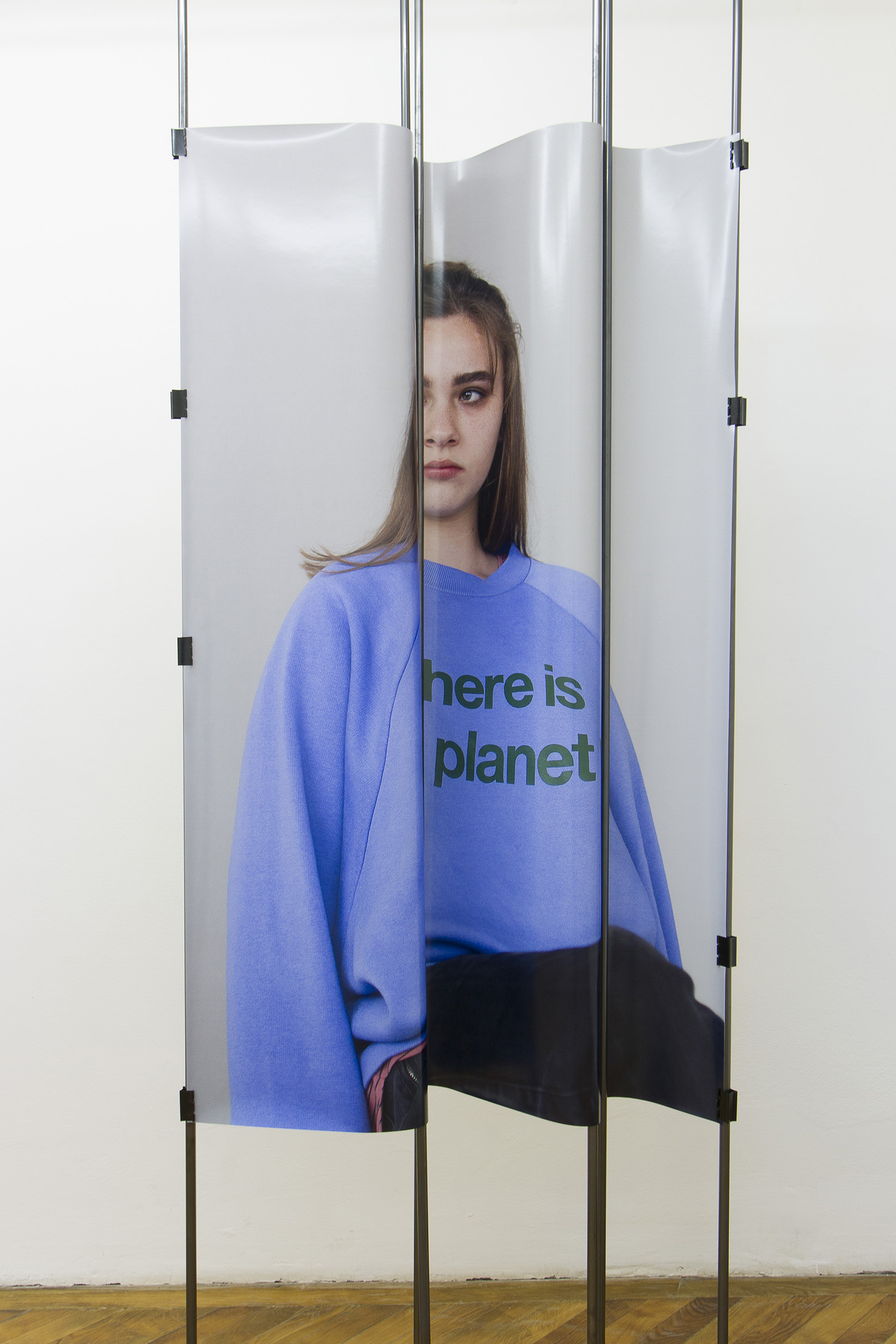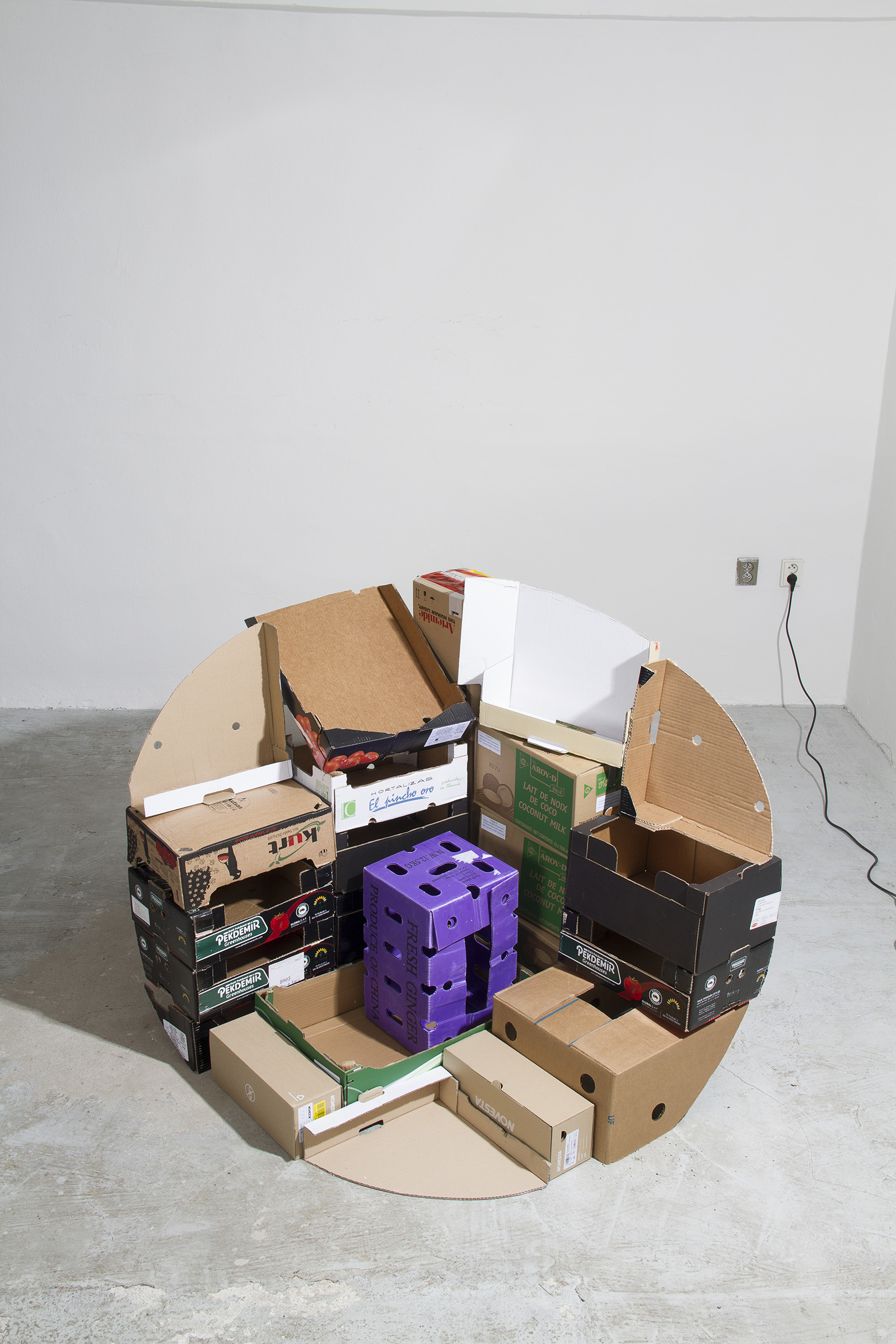my thoughts have been replaced by Beyoncé lyrics
solo exhibition of Leontína Berková
21 Feb – 1 May 2019
Bratislava, Slovakia

News about climate change, islands of plastic, suffering animals, scandals and conflicts have eventually become a part of our everyday routine.
But what, in fact, mean our sudden ecological outbursts and what is the extent of our engagement? From an (unknowingly dyed) piece of clothes with an eco slogan (bought online for a very lucrative price from an unknown Chinese company) becomes just another thing from series of empty narcissistic gestures curated for our target group, instead of a well‑meaning strong and visible statement with an urgent reference craving for immediate action. Likewise, it is possible (and important) to also reassess personal investment in other goods, whether it is organic food from an import or a recycled smartphone case, which travels to us for weeks from another continent. Many times funds spent on the purchase of similar items are not presenting a real contribution to a greener economy, whereas the ethics of production, durability of these products, as well as the way of transportation to the customer, are shifted to the detriment at the expense of a properly designed product according to the current market needs with a simple intent: to make a profit.
Other business generators, which slyly understand our increasing need for sharing of individual opinions (even) in an everyday life, are related to this. A desire of all people to take a stance has become very profitable on all social and especially political fronts, from home‑made badges to products from the studios of renowned fashion houses. For example, participation in public protest assemblies has transformed into a new way of spending leisure time, on which you meet with your friends, you listen to carefully prepared speeches of invited speakers, taking these moments with a promise of belonging to a higher context, which goes beyond our personal being.
Christopher Wylie has recently described how his ex‑employer — Cambridge Analytica company misused personal information of users of social platforms such as Facebook and targeted political advertising at the time before the US presidential election in 2016.
But what, in fact, mean our sudden ecological outbursts and what is the extent of our engagement? From an (unknowingly dyed) piece of clothes with an eco slogan (bought online for a very lucrative price from an unknown Chinese company) becomes just another thing from series of empty narcissistic gestures curated for our target group, instead of a well‑meaning strong and visible statement with an urgent reference craving for immediate action. Likewise, it is possible (and important) to also reassess personal investment in other goods, whether it is organic food from an import or a recycled smartphone case, which travels to us for weeks from another continent. Many times funds spent on the purchase of similar items are not presenting a real contribution to a greener economy, whereas the ethics of production, durability of these products, as well as the way of transportation to the customer, are shifted to the detriment at the expense of a properly designed product according to the current market needs with a simple intent: to make a profit.
Other business generators, which slyly understand our increasing need for sharing of individual opinions (even) in an everyday life, are related to this. A desire of all people to take a stance has become very profitable on all social and especially political fronts, from home‑made badges to products from the studios of renowned fashion houses. For example, participation in public protest assemblies has transformed into a new way of spending leisure time, on which you meet with your friends, you listen to carefully prepared speeches of invited speakers, taking these moments with a promise of belonging to a higher context, which goes beyond our personal being.
Christopher Wylie has recently described how his ex‑employer — Cambridge Analytica company misused personal information of users of social platforms such as Facebook and targeted political advertising at the time before the US presidential election in 2016.
According to the fashion preferences of individual users, they were able to predict their political tendencies — classic American denim brands such as Wrangler or Lee Jeans were an indication for a more conservative view, while fans of fashion houses such as Kenzo or Alexander McQueen, were automatically moving towards more liberal attitudes.
This assumption is nothing surprising, as Wylie said: “When we rethink the fascist movements, the first thing they did was create aesthetics.” From the red caps Make America great again from the Trump's pre‑election campaign to the white polo shirts and the beige/khaki trousers from the white supremacist marches in the US in August 2017, or typically green top clothes of party supporters of ĽSNS, this statement is undoubtedly valid even today.
The origin of these artifacts is often questionable and problematical, the motivation for their production, the conditions in which they were produced, as well as the use of funds acquired through their sale. The same principle of uniformity, interpreting political attitudes through the aesthetics of a personal appearance, of course also applies to liberal movements in society. Just remember the Suffrage movement and the iconic red lipstick marketed by Elizabeth Arden, or a present example, such is undoubtedly the Christian Dior's white house t‑shirt from the spring/summer 2017 collection. It was created by Maria Grazia Chiuri with the simple inscription 'We should all be feminists' (inspired by the essay by Chimamanda Ngozi Adichie) and was sold for 710 US dollars, which was offending the public. A part of the t‑shirt sales was credited to The Clara Lionel Foundation account (a non‑profit organization behind which is singer Rihanna and which was awarded the Humanitarian of the Year title in 2017 by the Harvard Foundation).
Therefore, the real change will not happen by reassessment at the most basic level of our day‑to‑day decisions. The initiative must be taken by world leaders and producers themselves. Anyhow well‑meant purchase from each of us is otherwise only another instrument of late capitalism with the only goal — to profit.
This assumption is nothing surprising, as Wylie said: “When we rethink the fascist movements, the first thing they did was create aesthetics.” From the red caps Make America great again from the Trump's pre‑election campaign to the white polo shirts and the beige/khaki trousers from the white supremacist marches in the US in August 2017, or typically green top clothes of party supporters of ĽSNS, this statement is undoubtedly valid even today.
The origin of these artifacts is often questionable and problematical, the motivation for their production, the conditions in which they were produced, as well as the use of funds acquired through their sale. The same principle of uniformity, interpreting political attitudes through the aesthetics of a personal appearance, of course also applies to liberal movements in society. Just remember the Suffrage movement and the iconic red lipstick marketed by Elizabeth Arden, or a present example, such is undoubtedly the Christian Dior's white house t‑shirt from the spring/summer 2017 collection. It was created by Maria Grazia Chiuri with the simple inscription 'We should all be feminists' (inspired by the essay by Chimamanda Ngozi Adichie) and was sold for 710 US dollars, which was offending the public. A part of the t‑shirt sales was credited to The Clara Lionel Foundation account (a non‑profit organization behind which is singer Rihanna and which was awarded the Humanitarian of the Year title in 2017 by the Harvard Foundation).
Therefore, the real change will not happen by reassessment at the most basic level of our day‑to‑day decisions. The initiative must be taken by world leaders and producers themselves. Anyhow well‑meant purchase from each of us is otherwise only another instrument of late capitalism with the only goal — to profit.
Ľuboš Kotlár


*photos/artwork by Leontína Berková